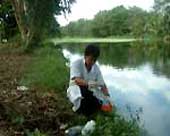 Many scientific projects hold significant practical application value and even market potential, yet they remain untapped in social life. This reality has persisted for many years without concrete solutions. To adapt, research institutes are currently struggling to find outlets for their scientific products, and these entities are in dire need of specific policies from management authorities.
Many scientific projects hold significant practical application value and even market potential, yet they remain untapped in social life. This reality has persisted for many years without concrete solutions. To adapt, research institutes are currently struggling to find outlets for their scientific products, and these entities are in dire need of specific policies from management authorities.
The Institute of Chemistry is considered one of the most capable units in generating high revenue among the numerous research institutes under the Vietnam National Science and Technology Institute. Annually, in addition to receiving 20 billion VND in research investment from the state budget, the Institute of Chemistry also generates its own revenue ranging from 2 to 3 billion VND. This independent revenue largely stems from workshops constructed through the investment of the institute’s staff. These workshops serve as sites for applying and producing products derived from the institute’s scientific projects.
Currently, this workshop is urgently manufacturing composite brake shoes for locomotives for units under the Vietnam Railways Corporation. However, this is merely a rare success story among dozens of research projects with practical value.
According to Dr. Pham Gia Dien, Director of the Center for Pharmaceutical Technology and Organic Biochemistry at the Institute of Chemistry – Vietnam Science and Technology Institute: “There is a high demand for scientific solutions in real life, and we are entirely capable of researching and resolving these issues. However, getting our products into various units is quite difficult. In reality, there is a need for supportive policies for the use of domestic scientific products.”
The food additive product that safely replaces borax is primarily produced from shrimp shell materials, ensuring food safety and hygiene requirements. The current production cost in the laboratory scale is 500 VND for the additive used to process 1 kg of meat and 100 VND for 1 kg of powder. This state-level scientific project has been assessed as outstandingly successful. Although it received a usage permit from the Food Safety Department at the end of 2003, the product has yet to be introduced to the market. In an effort to find a way out for their research results, after unsuccessfully marketing to production facilities, Dr. Nguyen Thi Ngoc Tu partnered with colleagues to establish a production facility.
Dr. Nguyen Thi Ngoc Tu, Head of the Pharmaceutical Polymer Research Department at the Institute of Chemistry, Vietnam Science and Technology Institute stated: “Building a production facility from our scientific projects is only a last resort when there are no other options left because we lack experience, business knowledge, and capital…”
In reality, the composite brake shoes for locomotives have been around for several years and are of good quality, but when the product was offered, it coincided with the time when cast iron brake shoes from China were being imported in large quantities. To date, the composite brake shoe product from the Institute of Chemistry has just begun to receive its first orders.
As for the food additive that replaces borax, after each health department inspection, food production facilities revert to using borax due to its low cost. This underscores that the profit motive in business, when not strictly monitored or penalized, often takes precedence over consumer health and safety.




















































